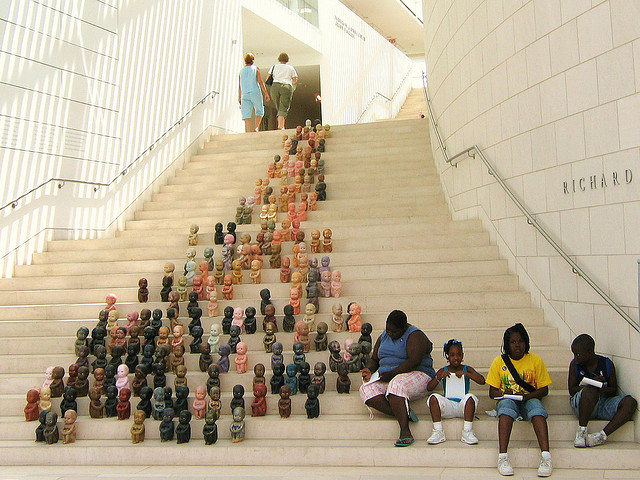The arguments against proportional representation have melted away
First Past the Post was designed for a previous era, when the two main parties polled in excess of 40% each. But while the way our votes are translated into political power is just one of the defects in our political system, it is the voting system which needs to be addressed first, argues Neal Lawson.
Credit JR P, CC BY NC 2.0
Close your eyes and imagine a democratic dystopia in which no one gets what they want. Now open them. Welcome to the politics of Britain in 2015. An election looms and whoever we vote for we wont get to save the planet, stop the inequality gap widening or end the housing crisis. If you’re a social democrat, a compassionate Conservative, an anything – forget it. It ain’t happening. Our democracy is broken – beyond repair – and the biggest irony of all is that this democracy crisis isn’t on the agenda either.
Politics no longer works like a see–saw. As one side goes down the other no longer automatically rises. The spell of the two-party duopoly is broken. It was broken on the rocks of globalization, individualization and now technology. Following the ‘big bang’ of the 1980s, power in the form of money went global while politics stayed national. At the same time the culture of consumerism and an end of deference swept the land. We no longer did as we were told or as expected. Today these twin mega trends are magnified and accelerated by the internet and social media in ways we are only just beginning to fathom. It’s left our political class stranded.
We recognise the symptoms. Westminster is hollowed out of talent because the talent knows the game is up. Instead it goes to corporations, the media, NGOs, tech start-ups – anywhere but Westminster. We look at David Cameron, Ed Miliband and Nick Clegg and feel at best pity, at worst fury. They appear like political pygmies compared to Attlee and Thatcher or even Ashdown and Blair. But here is the truth – all three, by some way, are the best leaders their respective parties have. There is no one better waiting in the wings. No one is coming to save us – this, under the current system, is as good as it gets.
Fixing that system is beyond policy tweak or personality trait. It can only be transformed for the 21st century through a totally new democratic architecture. Power needs to be passed up to the global level and down to the local. Direct and deliberative forms of democracy are going to have to be experimented with. But the first, and therefore foremost, we must remake our electoral system.
First past the post is strangling the life out of our democracy. With a third of the electorate refusing to vote for either of the main parties, outright power is impossible. We are in an era of NOC – no overall control, where weakness begets further weakness.
First past the post exaggerates support, in terms of seats, for the two main parties so the position is more precious than it looks. But why should either mainstream leader care how shrunken the political prize is when only one of them can lift it?
Close your eyes again and imagine waking up on 8th May. All that campaigning, all that political sound and fury and nothing, absolutely nothing will be settled. The ‘winner’ will pretend they have power – but they will have no mandate. The crown will be hollow. The economic, social, environmental and therefore political crisis will continue.
There were always two arguments for First Past the Post – it delivered strong single party government and it maintained the link between the MP and the constituent. We know it is unlikely to ever result in a single party majority again and we know too what MPs think about the link to their constituents given their rejection of the right to Recall them. Today there is no objective case for our busted voting system – just a misguided vested interest in its retention. It is so indefensible that even those who deny climate change cant deny the electoral crisis we face. Nigel Lawson, recently accepted that “First-past-the-post was well suited to the old two-party era. In the present ferment, with four parties vigorously contesting all seats, it is no better at providing a stable government than proportional representation”. (Sunday Times 16th Nov 14)
The case for a proportional voting system that matches seats to vote is now unanswerable. Indeed negotiated and systematized coalitions is the only thing that will give Britain any sense of political stability. It is time to grow up embrace complexity and a politics that is open and consensual. Only children demand that they are the centre of the universe. None of this means we stop believing in a good society or that the bonds of ideas and tribes no longer matter – but our beliefs are going to have to be negotiated, not imposed.
For the next few months we will be fed a dull diet of the least worst option. But more and more simply refuse to accept the politics of no choice. They will vote Green, SNP, UKIP, for a myriad individuals and causes – even when they know they are electorally hopeless. Or they will elect to stay at home and reject a system they know is utterly broken. And so the Westminster bubble shrinks further – but how long before it bursts?
Multi-party politics can’t be squeezed into a two party straightjacket. Mainstream politicians have no incentive to change the voting system – but we do. We have the incentive of hope and the belief that progress is still possible. This must be the last election under a voting system that fails the many but not the few.
—
The Compass Change How? conference where all this and more will be discussed is on Sunday 8th February.
Note: this post originally appeared on Our Kingdom. It represents the views of the author and not those of Democratic Audit UK or the LSE. Please read our comments policy before posting.
—
 Neal Lawson is the Chair of the campaign group, Compass
Neal Lawson is the Chair of the campaign group, Compass






 Democratic Audit's core funding is provided by the Joseph Rowntree Charitable Trust. Additional funding is provided by the London School of Economics.
Democratic Audit's core funding is provided by the Joseph Rowntree Charitable Trust. Additional funding is provided by the London School of Economics.
Storbritannien vill ha mer PR – Sverige mindre?: The arguments against proportional representation have melted away https://t.co/aKvK2kOsma
H/N5: why FPTP doesn’t work and our political system is broken. https://t.co/hslierAOsE
This. So Much. >> The arguments against proportional representation have melted away https://t.co/B40WJn1IrB
“The arguments against proportional representation have melted away” https://t.co/btsDTaLZSZ #PR #SMD #FirstPastThePost
RT @CvdEijk: I second that! RT @PJDunleavy: The arguments against proportional representation have melted away https://t.co/5dBmDzUKQT
@Neal_Compass: the arguments against proportional representation have melted away | via @democraticaudit https://t.co/dfr3K9PXYn
Imagine a democratic dystopia where no one gets what they want…
Welcome to UK politics 2015 https://t.co/y2kfuXej2i #GE2015
RT @democraticaudit: The arguments against proportional representation have melted away: https://t.co/1nmdlVp3W3
The arguments against proportional representation have melted away https://t.co/HeVPX6sXWH https://t.co/HR8gLCx0hu
RT @OccupyLondon: The arguments against proportional representation have melted away https://t.co/Hg53No5R7H via @democraticaudit #occupyde…
The arguments against proportional representation have melted away https://t.co/vctCuJySwJ via @democraticaudit #occupydemocracy #olsx
The arguments against proportional representation have melted away https://t.co/HiaKqZvoH2